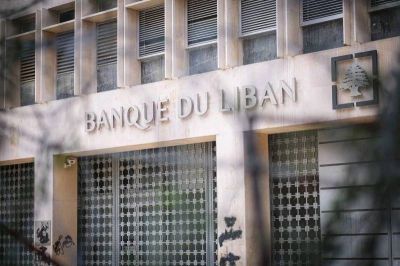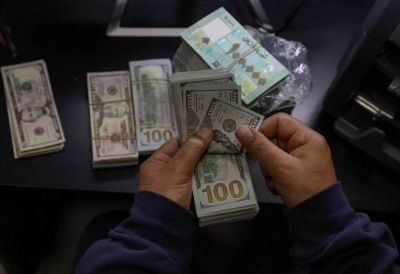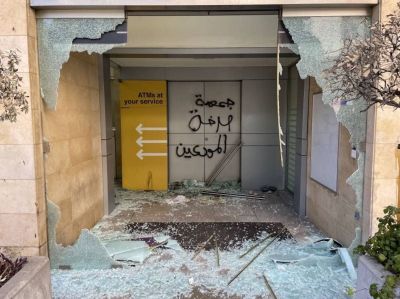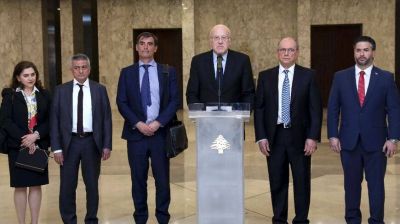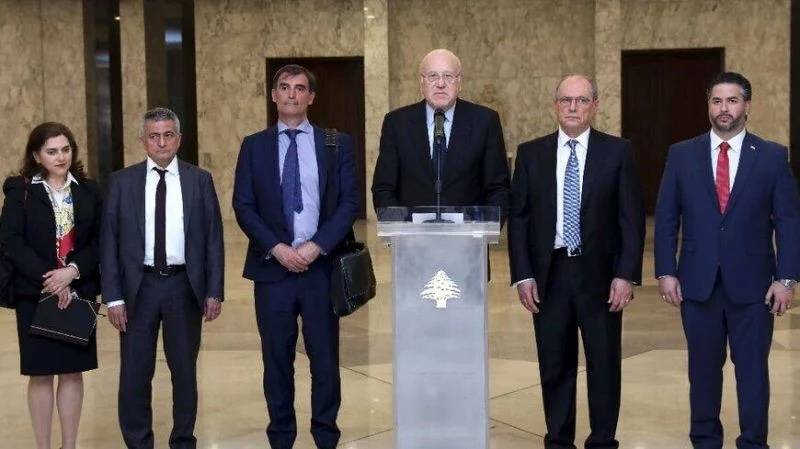
Prime Minister Najib Mikati's press conference alongside an IMF delegation during the signing of the preliminary agreement with the IMF on April 7, 2022. (Credit: Dalati and Nohra)
The last three years have been unprecedentedly difficult for Lebanon. The size of the economy declined sharply, about 80 percent of the population is now living in poverty and inflation has risen to mid-high triple-digit levels over the past two years. At the same time, the currency has lost more than 97 percent of its value in the parallel market that emerged with no end in sight to its depreciation. Banque du Liban’s reserves have plummeted, the government remains in default and the banking system is insolvent. While the crisis has taken its toll on already weak government services and social protection mechanisms, a notable increase in emigration is depleting the country of valuable talent and skills.
The government has formulated a comprehensive macroeconomic adjustment plan to lift Lebanon out of the current crisis which would be the basis of an IMF-supported program. However, difficulties and slowness in implementing the measures agreed with IMF staff, the seeming resilience of the population and gas production prospects have raised doubts about proceeding rapidly with the government’s plan and IMF involvement. There are several problems in relying on gas revenues to solve the crisis. There is no certainty on the amount or timing of these revenues, especially as exploration has not started yet. In most forecasts, gas revenues will be a small fraction of the government debt and are many years away. Irrespective of the amount of gas revenues, there is also a need to strengthen governance so that these revenues are not mismanaged. With regard to the resilience of Lebanon’s population, even though the population is adapting to the new economic and social realities, there is a need for measures to reverse the massive and sudden increase in poverty rates. There is also an immediate need to improve access to decent social services—including health and education — to which large segments of the population no longer have access.
IMF’s catalytic role
Lebanon needs to undertake reforms with or without the IMF. The program that was agreed upon with IMF staff does not impose any measures that are not already included in the government recovery plan and that the IMF does not consider to be in the interest of Lebanon. There is an urgent need for wide-ranging measures to address the imbalances in the public sector and the balance of payments, restore debt sustainability, provide effective social protection, restore credibility in the currency and strengthen economic governance. These measures should be taken with or without an agreement with the IMF.
The most important aspect of an IMF-supported program is the credibility that it would give to Lebanon’s economic policies. This single consideration is more important than the amount that IMF lends. Lebanon could implement a reform program without IMF involvement. However, the IMF’s participation — by helping to formulate the program, monitoring its implementation and providing an independent assessment of the appropriateness of policies — would give Lebanon’s reform program the credibility it needs that appropriate policies are being taken to address its macroeconomic imbalances and structural weaknesses.
Lebanon would receive substantial additional financial support for implementing an IMF program. While the funding to be provided by the IMF is significantly below Lebanon’s needs, an agreement with the IMF would lead donors and creditors to provide significant assistance to Lebanon. International financial institutions like the World Bank and other bilateral creditors and donors would provide financial support to Lebanon once the IMF Executive Board approves the program. This aspect of IMF programs is quite common, and it is referred to as the IMF’s catalytic role. Irrespective of the amount to be provided by the IMF, an IMF program would not be approved by the Executive Board without assurances from donors and creditors that Lebanon’s external financing needs will be met. This additional support is estimated at about $8-10 billion over the four-year duration of the program.
Assurances
An arrangement with the IMF would also facilitate negotiations with bondholders. Bondholders have made an agreement on the restructuring the public debt contingent on an IMF program, as they have done before with other countries. Bond holders need assurances that Lebanon will be able to honor the renegotiated terms of the bond contracts. An IMF program would help provide these assurances.
Lebanon may receive additional financial support from the IMF once program implementation begins. Under IMF policy, lending to Lebanon is limited to specific multiples of its quota with the IMF given that the Lebanese government is currently in default. Under current limits, IMF lending to countries whose public debt is assessed to be unsustainable cannot exceed 145 percent of their quota per year, or a cumulative of 435 percent at any time. Lebanon’s quota is Special Drawing Rights (SDR)633.5 million, equivalent to about $840 million. This lending limit translates to about $1.2 billion per year, subject to a ceiling of about $3.6 billion for total lending. Amounts in excess of these limits are considered exceptional and are subject to additional criteria related to the need for higher financing, debt sustainability, the ability to regain market access and prospects for the program’s success. The IMF may therefore have some room to increase lending to Lebanon, even if Lebanon’s debt is assessed as unsustainable, in the event that there is a balance of payments need and the program is on track.
An IMF program will give priority to technical assistance requests. The IMF provides technical assistance in several economic and financial areas. This assistance is provided free of charge to most countries, including Lebanon. Country requests for technical assistance exceed the capacity of the IMF to deliver it, so the IMF prioritizes this assistance. Typically, countries with current IMF programs get priority, especially for measures that are key to the success of the program. This assistance covers a wide range of areas related to central banking, fiscal measures and the development of statistics, all of which could be very useful for Lebanon as it rebuilds its public institutions.
There is sometimes a stigma in having to resort to the IMF. Such programs are usually an indication that country authorities have gone off course in the management of the economy (except in the event of an unforeseen external shock) and are in need of outside advice and financial support to get them out of their difficulties, subjecting their policies to intense scrutiny by IMF staff. However, these considerations pale in comparison to the benefits stemming from an IMF program, assuming a country is truly serious about economic and financial reform.
Sami GEADAH is an economist, who is currently an Associate Fellow at the Issam Fares Institute of the American University of Beirut. He had a long career at the IMF, both on staff and as a member of the Executive Board.
